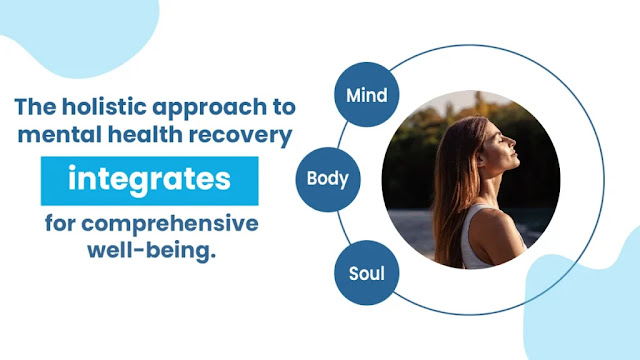Holistic Mental Health: A Comprehensive Approach to Emotional and Physical Well-being
In a world where stress, anxiety, and mental health challenges are becoming increasingly prevalent, the importance of adopting a holistic approach to mental health is gaining recognition. Holistic mental health emphasizes the interconnectedness of the mind, body, and spirit, focusing on treating the person as a whole rather than addressing symptoms in isolation. By combining traditional therapies with alternative and natural practices, holistic mental health offers a comprehensive way to nurture emotional, mental, and physical well-being.
The Mind-Body Connection
At the core of holistic mental health is the belief in the mind-body connection—the idea that our mental and emotional states can influence our physical health, and vice versa. Chronic stress, for instance, has been linked to a range of physical ailments such as high blood pressure, digestive issues, and weakened immune function. Similarly, physical health issues like chronic pain or inflammation can exacerbate mental health challenges like depression or anxiety.
To address this connection, holistic approaches seek to balance both mind and body. Practices such as yoga, mindfulness meditation, and Tai Chi are commonly used to reduce stress and anxiety while simultaneously promoting physical health. These practices emphasize mindfulness, deep breathing, and movement, allowing individuals to release tension, improve their emotional well-being, and enhance their body’s natural healing processes.
Nutrition and Mental Health
What we put into our bodies has a profound impact on our mental health. Diets high in processed foods, sugar, and unhealthy fats have been linked to an increased risk of depression and anxiety. Conversely, a nutrient-rich diet can boost brain function and emotional resilience.
A holistic mental health approach encourages the adoption of a whole-food, plant-based diet rich in vitamins, minerals, and healthy fats. Foods high in omega-3 fatty acids, such as walnuts and flaxseeds, are known to support brain health and reduce inflammation. Likewise, antioxidant-rich fruits and vegetables like blueberries and leafy greens help protect the brain from oxidative stress.
Herbal medicine is another aspect of holistic health that is gaining attention. Herbs like ashwagandha, St. John’s wort, and rhodiola are natural remedies that have been used for centuries to treat anxiety, depression, and stress. While these herbs should always be taken under the guidance of a healthcare provider, they offer a gentle, natural way to support emotional well-being.
Emotional and Spiritual Wellness
While addressing physical health is a key part of holistic mental health, emotional and spiritual wellness is equally important. Emotional health is often nurtured through practices like talk therapy, journaling, and creative expression, which help individuals process their feelings and experiences in a safe and healthy way. Holistic therapists may also incorporate energy healing practices, such as Reiki or acupuncture, to help balance the body’s energy and release emotional blockages.
Spiritual wellness, which doesn’t necessarily involve religious practices, is another important aspect of holistic mental health. Spirituality can involve a connection to something greater than oneself, whether through meditation, spending time in nature, or practicing gratitude. Developing a sense of purpose and meaning in life can significantly enhance emotional resilience and mental clarity.
Meditation and Mindfulness for Mental Health
Mindfulness meditation is one of the most powerful tools in the holistic mental health toolkit. It involves paying close attention to the present moment without judgment, helping individuals become more aware of their thoughts and feelings without being overwhelmed by them. Studies have shown that regular mindfulness practice can reduce symptoms of depression, anxiety, and PTSD, while improving overall emotional regulation.
Additionally, meditation has been linked to a range of physical health benefits, including lower blood pressure, reduced inflammation, and enhanced immune function. By promoting a sense of inner calm and awareness, mindfulness meditation fosters both emotional and physical healing, making it a cornerstone of holistic mental health care.
The Role of Social Connection
Holistic mental health also emphasizes the importance of social connection. Humans are inherently social beings, and our relationships with others play a vital role in our emotional health. Positive relationships provide support, reduce feelings of isolation, and help us cope with stress. On the other hand, unhealthy relationships can contribute to emotional distress and anxiety.
Engaging in community-based activities, group therapy, or even spending time with loved ones can help foster meaningful connections and emotional support. Holistic mental health promotes nurturing relationships as part of a balanced approach to well-being.
Conclusion
Holistic mental health offers a comprehensive, integrative approach to emotional and physical well-being. By treating the individual as a whole, rather than focusing solely on symptoms, holistic practices aim to promote balance in the mind, body, and spirit. Whether through nutrition, mindfulness, physical movement, or emotional and spiritual care, holistic mental health provides a path to healing that recognizes the intricate connections between all aspects of a person’s life. As we continue to understand more about the complex nature of mental health, the holistic approach is increasingly recognized as a powerful way to cultivate lasting emotional well-being in our fast-paced, stress-filled world.


.jpg)




0 Comments